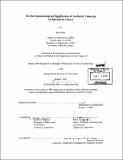On the epistemological significance of aesthetic values in architectural theory
Author(s)
Bhatt, Ritu
DownloadFull printable version (6.666Mb)
Alternative title
Epistemological significance of aesthetic values in architectural theory
Other Contributors
Massachusetts Institute of Technology. Dept. of Architecture.
Advisor
Stanford Anderson and Mark Jarzombek.
Terms of use
Metadata
Show full item recordAbstract
This dissertation examines the epistemological significance of "truth," "rationality," and the "aesthetic" first in the nineteenth-century definitions of the nature of Gothic and, then in more recent twentieth-century debates about objectivity. My study links the Aristotelian notion of practical reasoning to aesthetic cognition, and brings to surface the scientific, moral, and ethical arguments, which have been ignored by contemporary architectural criticism. The theoretical foundation of my argument lies in the work of analytic philosophers and literary theorists such as Hilary Putnam, Nelson Goodman and Satya P. Mohanty. These writers emphasize the rational and affective nature of our aesthetic experience and our aesthetic values and judgments, and propose a sophisticated account of objectivity by reexamining the actual nature of the "hard" sciences, interpreting them as complex, coordinated social practices. By drawing upon this understanding of objectivity, particularly as it relates to politics, I hope to bring to light a theoretical alternative to post-modernism in architecture that can enable us to explain the relationship of architecture to political power without abandoning the values of aesthetics, truth or rationality. My dissertation mediates between the disciplines of philosophy, literary theory, and architecture and tries to create space for inquiry wherein the epistemological, the theoretical, and the historical are interconnected.
Description
Thesis (Ph.D.)--Massachusetts Institute of Technology, Dept. of Architecture, 2000. Includes bibliographical references (p. 127-130).
Date issued
2000Department
Massachusetts Institute of Technology. Department of ArchitecturePublisher
Massachusetts Institute of Technology
Keywords
Architecture.